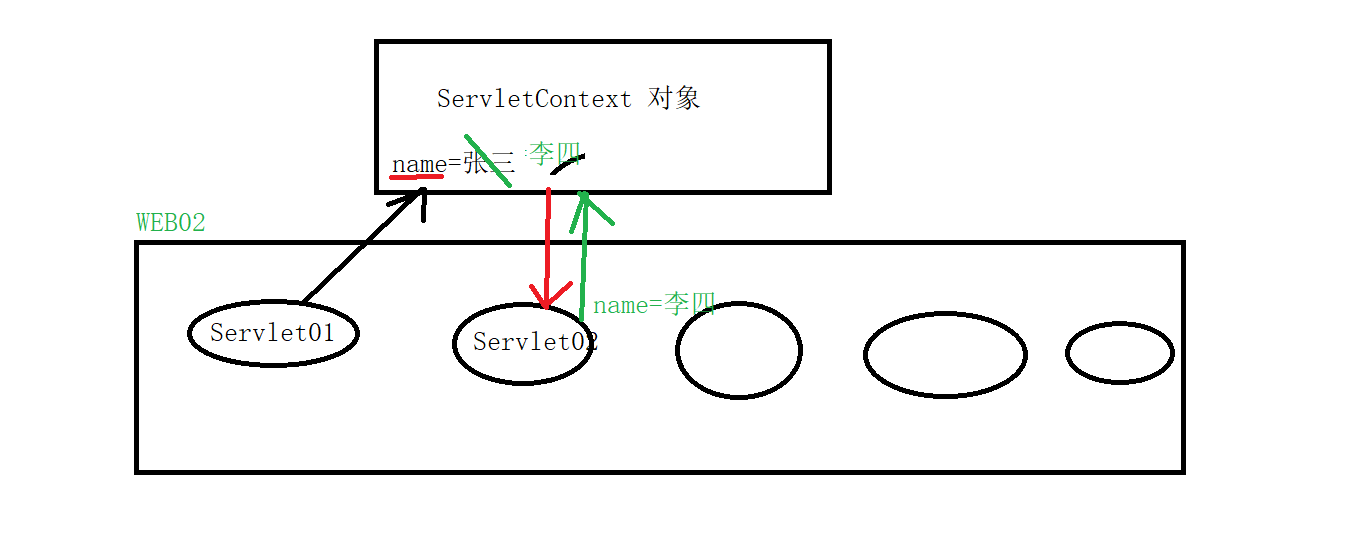0308 ServletContext对象
ServletContext对象中封装的真个web项目中的信息,一个web项目中只有一个ServletContext对象,但可以有多个servlet对象
ServletContext对象的生命周期 创建: 服务器启动或 发布web应用(前提,服务器启动状态) 销毁:web应用被卸载(服务器关闭,移除该web应用)
怎样获得ServletContext对象
之前是在servlet类中的init方法中通过config.getServletContext();得到一个对象
但是通过查阅API他们的继承关系 直接getServletContext()返回一个ServletContext对象。
作用
(1)获得web应用中任何资源的绝对路径
代码展示
1 2 3 4 5 6 7 8 9 10 11 12 13 14 15 16 17 18 19 | public class Servlet03 extends HttpServlet { public void doGet(HttpServletRequest request, HttpServletResponse response) throws ServletException, IOException { response.getWriter().write("hello dandan..."); //获取ServletContext对象 ServletContext context=getServletContext(); //获取服务器上资源的绝对路径 String pathA=context.getRealPath("a.txt"); String pathB=context.getRealPath("WEB-INF/b.txt"); String pathC=context.getRealPath("WEB-INF/classes/com/oracle/web/c.txt"); System.out.println(pathA); System.out.println(pathB); System.out.println(pathC); } public void doPost(HttpServletRequest request, HttpServletResponse response) throws ServletException, IOException { doGet(request, response); }} |
当发出请求


(2)ServletContext是一个域对象
ServletContext域对象的作用范围:整个web应用(所有的web资源都可以随意向 servletcontext域中存取数据,数据可以共享)
可以存取数据,可以实现从Servlet01中写入数据,从Servlet02中读取数据
数据存储的方式还是以键值对的方式存储,同时同一个键值对的key值相同就value值就会被覆盖掉
图解

域对象的通用的方法(所有域对象通用方法)
setAtrribute(String name,Object obj);
getAttribute(String name)
removeAttribute(String name);
代码展示 从Servlet01中写入数据,从Servlet02中读取数据
1 2 3 4 5 6 7 8 9 10 11 12 13 14 15 | public class MyServlet01 extends HttpServlet { public void doGet(HttpServletRequest request, HttpServletResponse response) throws ServletException, IOException { response.getWriter().write("hello dandan..."); //获取ServletContext对象 ServletContext context=getServletContext(); //域对象存值 context.setAttribute("name", "张三"); context.setAttribute("password", "123123"); } public void doPost(HttpServletRequest request, HttpServletResponse response) throws ServletException, IOException { doGet(request, response); }} |
1 2 3 4 5 6 7 8 9 10 11 12 13 14 | public class MyServlet02 extends HttpServlet { public void doGet(HttpServletRequest request, HttpServletResponse response) throws ServletException, IOException { //获取ServletContext对象 ServletContext context=getServletContext(); //域对象取值 System.out.println(context.getAttribute("name")); System.out.println(context.getAttribute("password")); } public void doPost(HttpServletRequest request, HttpServletResponse response) throws ServletException, IOException { doGet(request, response); }} |






【推荐】编程新体验,更懂你的AI,立即体验豆包MarsCode编程助手
【推荐】凌霞软件回馈社区,博客园 & 1Panel & Halo 联合会员上线
【推荐】抖音旗下AI助手豆包,你的智能百科全书,全免费不限次数
【推荐】轻量又高性能的 SSH 工具 IShell:AI 加持,快人一步
· 智能桌面机器人:用.NET IoT库控制舵机并多方法播放表情
· Linux glibc自带哈希表的用例及性能测试
· 深入理解 Mybatis 分库分表执行原理
· 如何打造一个高并发系统?
· .NET Core GC压缩(compact_phase)底层原理浅谈
· 手把手教你在本地部署DeepSeek R1,搭建web-ui ,建议收藏!
· 新年开篇:在本地部署DeepSeek大模型实现联网增强的AI应用
· Janus Pro:DeepSeek 开源革新,多模态 AI 的未来
· 互联网不景气了那就玩玩嵌入式吧,用纯.NET开发并制作一个智能桌面机器人(三):用.NET IoT库
· 【非技术】说说2024年我都干了些啥